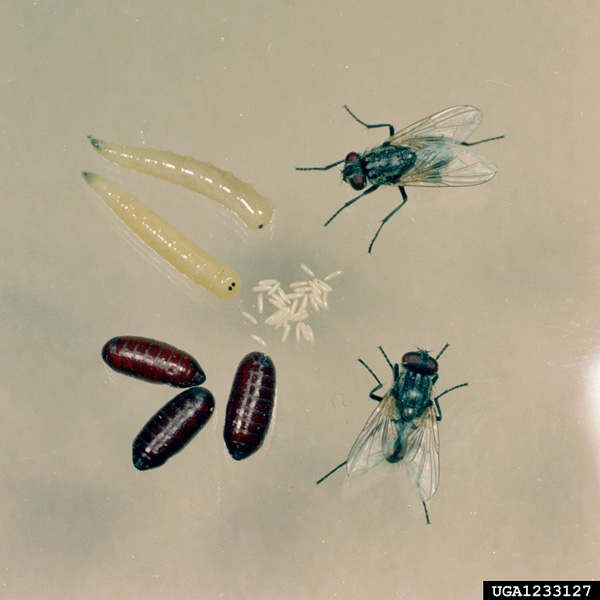
Horse owners and veterinarians have reported a bad fly season this year and, for many Southern states, there’s no end in sight. Flies are aggravating and distressing and bring along an inherent risk for summer sores.
“Summer sores are the product of a stomach worm, or Habronema (muscae) infection,” explained Nathan Voris, DVM, Senior Equine Technical Services, Zoetis. “As part of the Habronema life cycle, infective larvae are shed in horse feces and later picked up by houseflies. Infected flies deposit Habronema larva in open wounds, or into tissues around the horse’s mouth, lips, eyes and groin area damaged during feeding activities. The infection causes a significant inflammatory reaction, or summer sore. If Habronema and houseflies are both present, summer sores can be a problem for any horse.”
Persistent summer sores are extremely bothersome and slow to heal and, in many cases, remove the horse from training or showing. It’s a situation all too familiar to Carolyn Hornbeck of Raeford, North Carolina, and her 10-year-old American Quarter Horse gelding.
“He was a healthy horse that I’ve had for several years,” Hornbeck said. “It started out as a small sore on his ankle and, in no time at all, grew into a large wound comparable to the size of a giant filet (of steak) that would not heal. After a costly surgical procedure and eight months of treating several times, it scarred down to the size of a quarter, and he was able to go back to riding.”
It was a mystery to Hornbeck why her horse had encountered such a big problem. Like most horse owners, she was doing everything in her power to ensure he had proper care. Nearly four years after that awful summer sore experience, the problem returned, this time for a different horse. Hornbeck soon realized the importance of treatment and control of Habronema and the critical need to disrupt the parasite’s life cycle.
“Horse owners naturally tend to focus on treating the horse with the summer sore infection, but infective Habronema larvae are likely being shed by other, outwardly healthy horses in the same environment,” Voris said. “Aggressively controlling the Habronema stomach worm in every horse on the property is extremely important to prevent summer sores. Working with your veterinarian to develop a properly managed parasite control program that includes effective fly control and deworming, along with adequate sanitation, is the best way to protect horses from future infections.”
Voris recommends using QUEST (moxidectin) Gel as an effective option to treat and control Habronema in order to reduce the summer sore risk. Also, including SOLITUDE IGR (with 2.12% cyromazine) as part of a daily grain ration will help reduce fly burdens. In fact, attacking flies at the larval stage with SOLITUDE IGR could eliminate up to 27,000 flies daily per horse.
“Cyromazine, an insect growth regulator, interrupts the life cycle of Habronema larvae by inhibiting development of houseflies with 100% efficacy in freshly treated manure,” Voris explained. “When fly larvae develop in manure infected with Habronema larvae, any horse within the fly’s quarter-mile migration radius becomes at risk for infection. But SOLITUDE IGR helps to stop the vicious cycle. It is a valuable addition to any equine fly management program to increase comfort and decrease the spread of disease caused by flies.”
SOLITUDE IGR lowered the risk of fly-borne disease by eliminating large fly populations in Hornbeck’s barn and made the horses more comfortable. And, with the help of a proper deworming protocol, the Habronema problem is now under control.
“Just two weeks after I started feeding SOLITUDE IGR, there was a noticeable decrease in flies,” Hornbeck said. “Clean stalls and well-maintained pastures are not enough to stop my summer sore problems. Now, you will hardly find a fly in my barn. After evaluating my deworming plan to treat and control Habronema with QUEST and starting SOLITUDE IGR, I eliminated the fly traps, strips, bombs and excessive fly sprays that I was using before and seemingly cured my fly and summer sore problem.”
For a more technical overview of Habronema and summer sores, review the Two-Prong Approach to Preventing Summer Sores Zoetis.
Important Safety Information for QUEST Gel: Do not use QUEST Gel or QUEST PLUS Gel in foals less than six months of age or in sick, debilitated and underweight horses. These products should not be used in other animal species, as severe adverse reactions, including fatalities in dogs, may result.
Zoetis (zō-EH-tis) is the leading animal health company, dedicated to supporting its customers and their businesses. Building on a 60-year history as the animal health business of Pfizer, Zoetis discovers, develops, manufactures and markets veterinary vaccines and medicines, complemented by diagnostic products and genetic tests and supported by a range of services. With approximately 9,300 employees worldwide at the beginning of 2013, Zoetis has a local presence in approximately 70 countries, including 29 manufacturing facilities in 11 countries. Its products serve veterinarians, livestock producers and people who raise and care for farm and companion animals in 120 countries. For more information on the company, visit www.zoetis.com.
Zoetis is the proud sponsor with the Smithsonian Institution Traveling Exhibitions and the American Veterinary Medical Association of the mobile educational exhibit Animal Connections: Our Journey Together. Families visiting the exhibit will explore the vast bonds between people and animals and learn about the important role veterinarians play in protecting animal and human health. For more information, visit http://www.zoetis.com/animal-connections-tour/.



